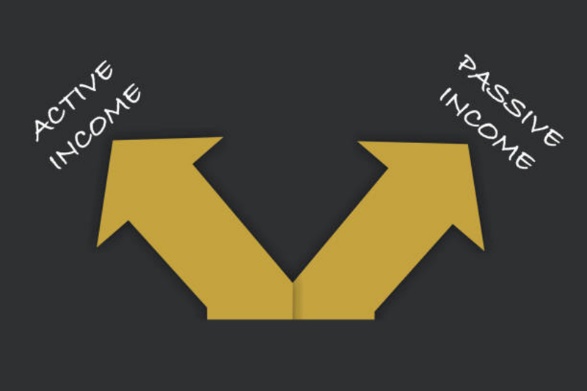As you pursue financial security and freedom in your life, there are two distinct paths that could steer the direction of your journey—active income or passive income. While both can provide sources of cash flow into your pocket (and eventually make you rich), they each have their specific advantages and disadvantages. In this blog post, we’re going to uncover what active income and passive income really mean, why you should care about them as an entrepreneur or investor, and which one will best work in your favor. Ready to learn more? Let’s go!
Defining Active and Passive Income
Many individuals use the terms "active income" and "passive income," but not everyone may understand what they mean. Active income is any money earned from performing a service or working for an employer. This type of income requires continuous effort to maintain, even if that effort may vary in intensity.

Passive income, on the other hand, is income earned without the need for constant labor or attention. It comes from sources such as rental properties, investments, or businesses that operate without significant input from the owner. Passive income often requires significant effort upfront, but once established, it can provide a steady stream of earnings with minimal upkeep.
Understanding the difference between active and passive income is crucial for individuals seeking financial stability and growth.
Advantages and Disadvantages of Active Income
Active income refers to the money earned through regular work, such as a salary or wages. One of the advantages of active income is its predictability, as it typically comes in weekly or monthly payments. This allows individuals to plan and budget more effectively.
However, a major disadvantage of active income is its limited potential for growth. Without additional sources of income, individuals can hit a ceiling on their earning potential and struggle to save for retirement or unexpected expenses. It's important to weigh these pros and cons when considering one's financial goals and options.
Advantages and Disadvantages of Passive Income
The most significant advantage of passive income is financial stability, where you can earn recurring income without trading hours for dollars. This type of income also provides you with freedom and flexibility, allowing you to pursue your passions and spend more time with family. On the other hand, passive income often requires a significant amount of time, energy, and money upfront to set up.
Additionally, passive income opportunities may be limited, and it can be challenging to find the right niche or product to generate sustainable income. Understanding the pros and cons of passive income is crucial in determining if it's the right path for your financial future.
Popular Ways to Earn Active Income

In a world where expenses seem to keep piling up, it's no wonder many people are looking for ways to boost their income beyond their day jobs. If you're looking to make some extra cash, earning active income is a great place to start. There are many popular ways to do so, from freelance work to renting out your property on Airbnb.
With freelance work, you can use your skills to earn money on the side.
Airbnb provides an opportunity to make money from your spare room or even your entire home.
Popular Ways to Earn Passive Income
Passive income has become a buzzword in the world of finance, and for good reason. Earning money while you sleep sounds like a dream come true, but it doesn't have to be just a fantasy. With the rise of the gig economy and technology, there are more opportunities than ever before to earn passive income.
From renting out your spare room on Airbnb to investing in dividend-paying stocks, there are countless ways to generate money with little to no effort. It's important to remember that passive income isn't always easy, but the rewards can be long-lasting and well worth the initial effort.
Investing Strategies for Both Types of Incomes
Investing is a crucial step if you want to secure your financial future. Whether you have a steady income or an unpredictable one, it's important to have a strategy that fits your situation. If you have a regular income, you can follow a conservative approach, where you invest in low-risk assets such as bonds and mutual funds.
On the other hand, if your income fluctuates, you can opt for a more aggressive approach, where you invest in high-risk/high-reward stocks or real estate. The key is to understand your risk tolerance and investment goals, so you can make smart choices and reap the rewards later on. Whatever your income type may be, there are investment strategies that can help you grow your wealth over time.
Conclusion:
Active and passive income are both great ways to increase your financial well-being, but each comes with its own rewards and risks. There is no one-size-fits-all solution when it comes to income sources; your individual situation should dictate which type of income source or strategy works best for you. From actively working as an employee, freelancer, or small business owner to making investments in real estate, peer-to-peer lending, or dividend stocks, there’s plenty of opportunity for the savvy investor to make money passively.
FAQs:
Q: What are some popular ways to earn active income?
A: Popular ways to earn active income include freelance work, selling products online, and renting out property on Airbnb.
Q: What are some popular ways to earn passive income?
A: Popular ways to earn passive income include investing in dividend-paying stocks, peer-to-peer lending, and getting involved in the gig economy. It's important to understand the pros and cons of each option so you can make an informed decision.
Q: How do I know which type of income source is right for me?
A: The best way to determine which type of income source is right for you is to evaluate your individual situation. Consider the amount of effort you are able to put in, the risk tolerance you have, and your financial goals. This will help you decide which type of income source or strategy is likely to be the most beneficial for you in the long run.







